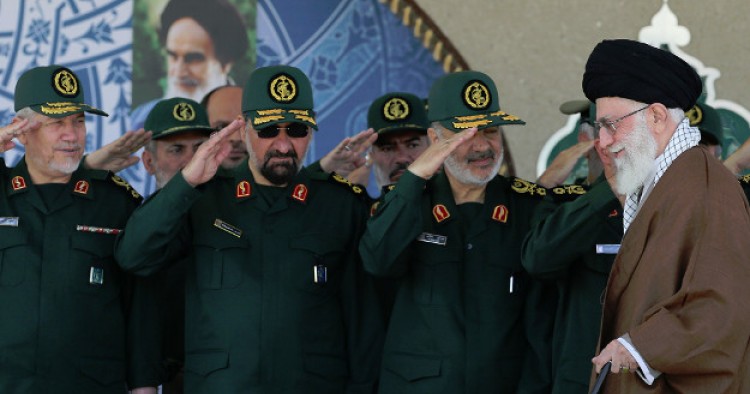The deputy commander of the Islamic Revolution Guards Corps (IRGC) has said that the United States is no longer to “pull off a victory” in the Middle East and claimed that Tehran and its allies are driving the US forces out of the region. “Today, we’re chasing the enemy to the eastern Mediterranean and the Red Sea,” Brigadier General Hossein Salami was quoted by the Iranian media as saying. He further boasted that America has failed in Afghanistan, Iraq and Syria despite spending trillions of dollars while the Islamic Republic has been able to expand its influence across the region with minimal expenses. “The more they spent, the more the Islamic revolution benefited from it,” he added, referring to the US interventions in in the region. Salami also emphasized jihad (holy war) is a key principle of Islam, and that now “everywhere has become the place for jihad against the enemies of Islam and Muslims.” The deputy IRGC commander also pointed out that Tehran will add to its power despite international pressure. “Weak nations have either been removed from the political geography or have been occupied and made to surrender. Only those who stood up have remained. And we will continue this path.”
Comment: With the Islamic State collapsing in Iraq and Syria, Iran and its regional proxies see the United States as the primary threat to their influence and ambitions and have stepped up efforts to oust the US military from the region. Through diplomatic outreach – and at times explicit and implicit threats – Iranian leaders have been urging the Afghan and Iraqi governments to expel American forces from their countries. Tehran has also deepened its ties with the Taliban and has reportedly teamed up with Moscow to undermine US-led stabilization efforts in war-torn Afghanistan. In Iraq, Iranian-supported paramilitary forces have dialed up propaganda against the United States and its allies and are pressuring the Baghdad government to expel American forces from the country. Likewise in Syria, the IRGC and its regional Shiite militia affiliates threaten the US military and its allies. Moreover, the IRGC naval forces frequently harass US ships in the Persian Gulf, and Iran’s political and military leaders have ratchet up hostile rhetoric against US military bases in the Middle East.
Last year, Iranian Parliament Speaker Ali Larijani told his Afghan counterpart Abdul Rauf Ibrahimi that “there is no need for the presence of foreign military forces in Afghanistan” and pledged that Iran was ready to help Kabul tackle its security challenges. “The people of Afghanistan are able to deal with them [terrorists], and the presence of foreign troops under the pretext of fighting terrorism has hindered Afghanistan’s development,” the top Iranian lawmaker said. “Iran will do anything it can to help Afghanistan combat terrorism,” he added.
Likewise, Supreme Leader Ali Khamenei said Iran opposed the presence of American forces in Iraq and urged the visiting Iraqi prime minister not to rely on Washington. “Do not trust the Americans under any circumstances because they are waiting for an opportunity to do harm,” the supreme leader told Haider al-Abadi at a meeting in Tehran. Khamenei accused the United States of sowing discord in Iraq for its geopolitical interests and added: “They should not be given this opportunity. Also, the deployment of American forces to Iraq under the pretext of training and other matters should be avoided.”
In Syria, the IRGC has deployed thousands of Lebanese Hezbollah fighters as well as Iraqi and Afghan militiamen to southern and eastern Syria to challenge the presence of American troops in al-Tanf region along Syria’s borders with Iraq and Jordan, and to create a second war front against Israel. During the summer, an Iranian-made drone fired on al-Tanf, provoking the US military to strike back and destroy it. U.S. forces also launched an air strike against an Iranian-directed convoy approaching coalition forces near al-Tanf area.
The Middle East Institute (MEI) is an independent, non-partisan, non-for-profit, educational organization. It does not engage in advocacy and its scholars’ opinions are their own. MEI welcomes financial donations, but retains sole editorial control over its work and its publications reflect only the authors’ views. For a listing of MEI donors, please click here.












